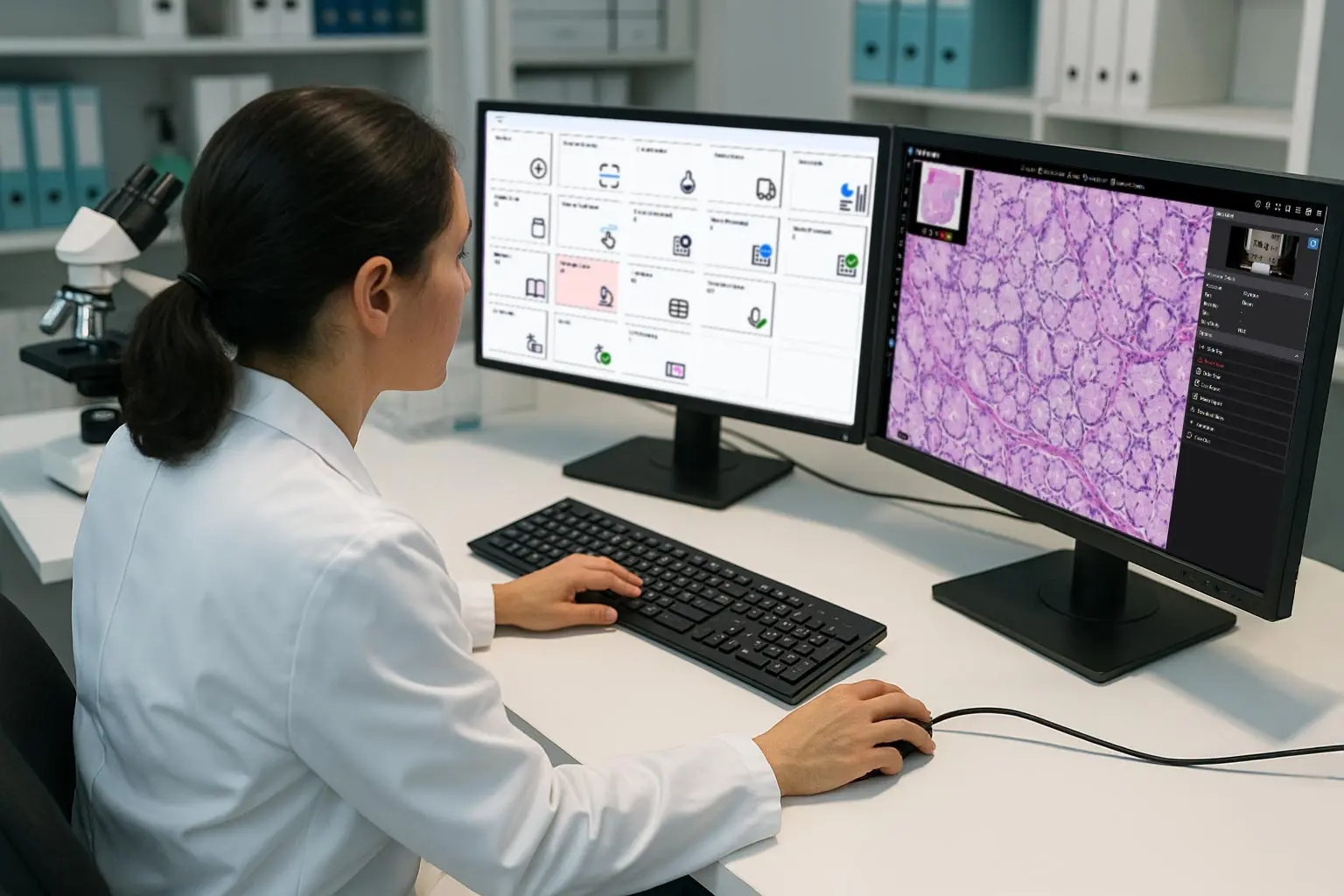Blog
What You Need to Know About the CMS Plan to Regulate Improper Lab Payments in 2025
December 2, 2025
The Centers for Medicare & Medicaid Services (CMS) released its Fiscal Year 2024 Improper Payments Fact Sheet in November, highlighting various instances of improper payments across several healthcare services, including clinical laboratory services.
As we move into 2025, anatomic and clinical pathology labs should know that CMS plans to more closely regulate improper payments and robustly enforce corrective actions in the new year. Because of this, they should take the necessary steps to avoid violations and the accompanying stiff penalties.
Why is More Regulation Needed?
So why is there a need for more stringent regulation and enforcement? The simple answer is to address ongoing issues such as fraud, waste, and abuse within laboratory billing practices.
Key Reasons for Heightened Regulatory Focus
Rising Improper Payment Rates: CMS periodically audits healthcare providers and suppliers to identify improper payments, including overpayments, underpayments, or payments made without sufficient documentation. Improper payment rates in clinical laboratories have been a persistent issue, prompting closer oversight.
High Costs of Laboratory Services: Laboratory services represent a significant portion of healthcare spending. Inaccurate laboratory billing (lab revenue cycle management) or improper payments can inflate costs unnecessarily, burdening taxpayers and healthcare budgets.
Compliance with Medicare and Medicaid Rules: Laboratories must adhere to strict coding, documentation, and lab billing rules under Medicare and Medicaid. Noncompliance, intentional or accidental, can result in substantial financial losses for CMS.
Increased Fraud Cases: The healthcare system has seen cases of fraudulent lab billing practices, such as submitting claims for unnecessary tests, upcoding, or billing for services not rendered. Tighter regulation helps prevent these abuses.
Promoting Accountability and Transparency: Enhanced oversight aligns with CMS’s broader goals of ensuring that healthcare providers operate transparently and accountably, fostering trust in the Medicare and Medicaid programs.
Evolving Payment Models: With the shift toward value-based care, CMS aims to ensure that payments align with the quality and necessity of services provided rather than the volume of services.
By implementing more stringent regulations and oversight mechanisms in 2025, CMS seeks to reduce financial losses, improve the integrity of clinical laboratory billing, and ensure that funds are used appropriately to deliver necessary and effective care.

Common Causes of Improper Lab Payments
Even though the CMS fact sheet mentioned above didn’t provide specific examples of improper lab payments in 2024, it did identify a few common causes that apply to clinical lab services.
Insufficient Documentation: This occurs when the provided documentation does not adequately support the billed services, making it challenging to verify that the services were necessary and delivered as claimed.
Medical Necessity Errors: These errors arise when the submitted documentation fails to justify the medical necessity of the services provided, leading to payments for services that may not meet coverage criteria.
Incorrect Coding: This involves inaccuracies in the coding of services, such as using incorrect procedure codes or modifiers, which can result in improper payments.
To mitigate these common issues, CMS continues to emphasize the importance of thorough documentation, accurate coding practices, and adherence to medical necessity criteria to ensure clinical lab compliance and avoid being the target of oversight.
What Can Clinical Labs Proactively Do to Avoid Fault?
Clinical laboratories can take several proactive steps to avoid CMS penalties for improper payments going forward, and lab revenue cycle management vendors should be able to help in this regard. What follows are measures that focus on compliance, documentation, staff training, and ongoing quality improvement to ensure adherence to Medicare and Medicaid regulations, plus some helpful comments from Gayane Haroutyunyan and Aram Avakyan, highly skilled members of LigoLab’s lab billing support team.
Strengthen Documentation Practices
Ensure Complete Documentation: Maintain detailed records supporting the medical necessity of all laboratory tests and include complete test requisitions, physician orders, and supporting patient data.
Educate Ordering Providers: Train physicians and healthcare providers on documentation requirements and provide clear guidelines on what information is needed to justify laboratory tests.
“Having a robust document management system is a good first step toward CMS compliance,” said Haroutyunyan. “For example, the laboratory’s lab billing platform should make it easy to access and print documentation that may be required for lab billing, and if the platform is deeply integrated with the LIS system, all documentation is consolidated in the same data entity, the encounter record.”
Improve Coding and Lab Billing Accuracy
Hire Qualified Staff: Employ certified coders who are familiar with CMS regulations, including CPT and ICD coding.
Regularly Update Laboratory Billing Solutions: Ensure that lab billing software is updated to reflect the latest CMS codes and guidelines.
Perform Pre-Submission Reviews: Audit claims before submission to identify errors in coding, documentation, or eligibility.
Learn More: Clinical Laboratory Management Solutions for Lab Revenue Cycle Management (Lab RCM)
“Modern laboratory billing solutions give users the ability to build dynamic workflow automation and eliminate what were previously mostly manual administrative tasks,” said Avakyan. “For example, the lab billing team would require a robust and streamlined pricing engine with pricing policies that work via extensive automation and rules, allowing for easy and convenient CMS code updates when necessary.”
Stay Informed on CMS Guidelines
Monitor Regulatory Changes: Keep up with CMS updates, including new policies, lab billing codes, and coverage criteria for laboratory services.
Participate in CMS Programs: Engage in educational webinars and workshops provided by CMS.
Conduct Regular Internal Audits
Review Claims: Periodically audit claims to ensure compliance with CMS requirements.
Identify Trends: Analyze common errors to implement corrective actions and prevent recurrence.
Implement Robust Compliance Programs
Develop a Compliance Plan: Create a formal plan to ensure adherence to CMS rules, including policies for documentation, laboratory revenue cycle management (lab RCM), and reporting.
Designate a Compliance Officer: Assign a dedicated professional to oversee compliance efforts and address potential issues proactively.
Use Advanced LIS System and Lab Billing Technology to Enhance Compliance
Leverage Laboratory Information Systems (LIS systems): Use LIS laboratory information system software with built-in compliance checks to flag potential errors before claims are submitted.
Adopt Decision Support Tools: Implement lab RCM tools that help verify medical necessity and eligibility criteria at the point of care.
“Modern laboratory billing solutions provide RCM tools that prevent improper payment due to a lack of medical necessity,” Haroutyunyan said. “These tools are NCD/LCD/MUE edits that are applied via automation and rules. The lab billing team can also review these edits on an individual CPT line right inside the encounter record.”
Learn More: How Much is Your Outdated Laboratory Revenue Cycle Management Costing Your Lab?
Verify Patient Eligibility
Real-Time Eligibility Checks: Use electronic systems to confirm patient eligibility before performing tests.
Ensure Authorization Compliance: Obtain prior authorization for tests when required by CMS.
Learn More: Workflow Tips to Help Manage Prior Authorization Requirements
Educate and Collaborate with Providers
Provide Targeted Training: Offer training sessions to ordering providers on proper test ordering and documentation practices.
Share Resources: Develop easy-to-understand guides and checklists for referring providers.
Monitor and Mitigate Overutilization
Implement Utilization Management: Review patterns of test ordering to identify and address overuse.
Work with Providers: Educate providers on appropriate test ordering based on CMS guidelines.
“Improper payments, especially underpayments can only be detected by a medical institution if it employs a modern lab RCM solution with reporting utilities that allow for this kind of visibility,” said Avakyan. “The LigoLab platform has reports that provide visibility on what any insurance company or insurance group pays on average for specific CPT codes or CPT code groups. So, underpayment trends can be easily monitored and addressed with this system.”
Respond to CMS Audits Effectively
Prepare for Reviews: Maintain a robust system for retrieving and providing documentation promptly during audits.
Correct Errors: Address findings from CMS audits and implement corrective action plans to prevent future issues.
Participate in Quality Assurance Programs
Engage in CMS Quality Initiatives: Participate in programs like the Quality Payment Program (QPP) to align operations with CMS goals.
Benchmark Performance: Use external benchmarks to assess and improve compliance and operational efficiency.
Editor’s Note: More information on CMS’ Improper Payments Measurement Programs can be found at https://www.cms.gov/ImproperPayments.
When clinical labs proactively focus on education, robust documentation, accurate laboratory billing, and internal audits they can significantly reduce improper payments and enhance compliance with CMS regulations. By fostering a culture of accountability and staying informed on policy changes, these clinical laboratories can maintain integrity and avoid any financial or reputational risk.

Learn How LIS System and Lab RCM Integration Transforms Lab Billing
Pathology lab software, such as standalone laboratory information systems and lab revenue cycle management systems, typically operate in closed silos that create disconnected entities lacking transparency and synchronization, leading to frequent denials caused by missing or inaccurate data. This leaves lab directors and managers with two costly options: reworking claims manually or writing them off as bad debt.
The LigoLab Informatics Platform offers a comprehensive, end-to-end solution for united LIS system and lab RCM workflow management. By integrating and automating processes within a unified informatics platform, LigoLab delivers superior performance and efficiency.
Learn More: The Best Laboratory Information System Companies and the Advantages They Offer to Their Laboratory Clients
Unlike outdated LIS software and laboratory billing solutions, LigoLab’s all-in-one platform enables clinical labs to initiate lab revenue cycle management at order entry - an essential and incredible advantage in today’s challenging environment of shrinking margins, rising costs, and tighter regulations.
Ready to experience the power and efficiency of pathology lab software integration? Then the next step is to contact a LigoLab product specialist.






